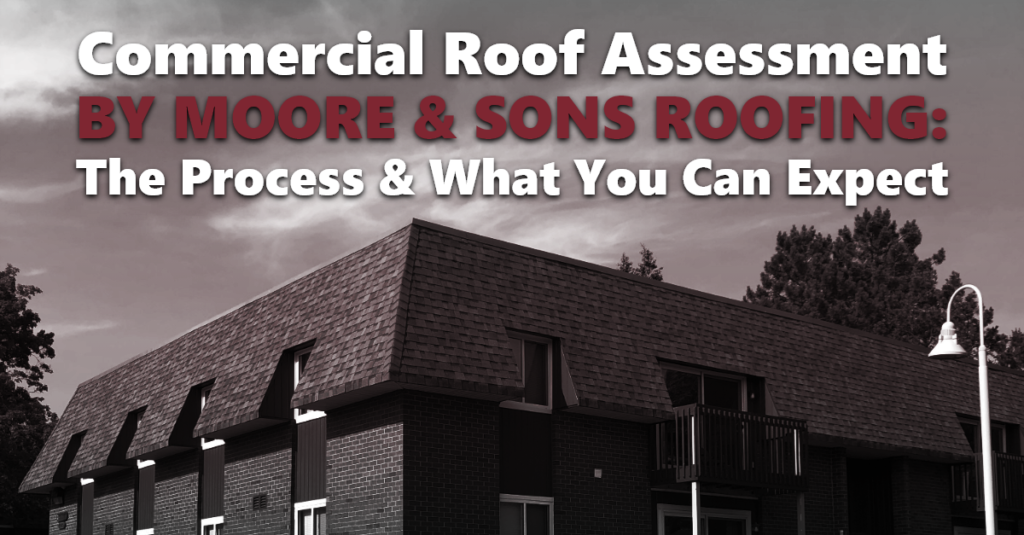How long has it been since your commercial roof was last inspected? If it has been more than a year, you are long overdue. At a minimum, a professional roofing contractor should inspect your commercial roof at least twice a year. Having a commercial roof assessment is critical for preventing roofing disasters, extending the life of your roof, and protecting the people, products, equipment, and inventory in the building.
But did you know not all roof assessments are created equal? Yes, the depth of inspection and information gleaned from the process is only as good as the experience and qualifications of your roofing contractor. You want to choose an experienced roofer who will go above and beyond, ensuring every inch of your roof has been assessed.
Commercial Roofing vs. Residential Roofing: What’s the Difference?
Design
Commercial building roofs differ from their residential counterparts in their low slope or flat design tendency. There’s typically a slight slope required to allow water drainage and prevent pooling water.
Commercial and residential roofs have different purposes. Commercial roofing design is based on function instead of decorative patterns, colors, and designs like residences. Commercial roofs also tend to have a much larger surface, which can be home to heavy items, such as industrial pipes, HVAC blowers, and solar panels.
Residential buildings have pitched roofs with steeper slopes. They are smaller than commercial roofs, and their surface usually has nothing sitting on it.
Roofing materials
The materials used in residential and commercial roofing vary based on their makeup, cost, and life expectancy. Asphalt shingles are the most popular roofing material for residential buildings. They are durable, cost-effective, and easy to install. Other options include tile, metal panels, wood shakes, and slate.
Flat or low-pitched commercial roofs are not good candidates for most residential roofing applications. Instead, they’re often covered with tar and gravel, modified bitumen, sprayed polyurethane foam, and single-ply coverings (EPDM, TPO, PVC).
Installation and Repair
Roof installation, maintenance, and repair differ significantly between residential and commercial properties. For instance, it can take a month or more to install a commercial roof because of its sheer size. On the other hand, residential construction can be completed in a few days.
The skillset between residential and commercial roofers differs as well. Residential roofers need a less specialized skill set compared to commercial roofers. Also, commercial roofing projects require specialized tools, safety equipment, and materials not needed for a residential roof.
What to Expect During a Commercial Roof Inspection
A quality commercial roof assessment starts before anyone even looks at the roof. A reputable roofer will begin with these two steps.
Examining Building Records
Certain activities or roof work types can void some products’ warranties. A roofer will examine active warranties and guarantees as they may influence what repairs can be done, especially if the roofing material is failing earlier than expected.
Checking the building layout and records can be significantly helpful in assessing the roof’s condition and determining what issues need close attention during the inspection.
Talking to Occupants
Interviewing people who spend their time in the commercial facility might also help identify problems. How often does the roof show signs of disrepair? In what weather conditions are the issues most prominent? Asking questions to gauge the situation is crucial.
Once the commercial roofing contractor gets a general idea of the building and its roof, they’ll begin the roofing inspection. A comprehensive roof assessment will include the following:
An Interior Inspection
Your roofing contractor should begin the assessment inside the building, looking for signs of rust, water stains, or potential weaknesses. They will inspect the interior roof deck, interior walls, and ceilings. Where water from a leaking roof ends can be an excellent indication of where the leak began.
Rooftop Inspection
Now your commercial roofing contractor is ready to head up to the roof. They’ll perform a visual inspection and check for many things, including:
- Ponding water
- Debris
- Uplifted seams
- Cracks
- Blisters on the flat roof system
- Holes
- Vegetation growth
- General wear and tear
The roofer will walk around the roof’s perimeter and work their way to the middle. The reason is that the perimeter edges tend to get more damage and wear out faster.
Inspection of Roof-Based Equipment and Accessories
Leaks can come from components and equipment that are in poor condition or have been poorly installed. Your roofing contractor will examine:
- Flashings
- Joints
- HVAC units
- Skylights
- Solar panels
- Communication equipment
- And other types of roof penetration or vulnerable spots
Assessment of the Drainage System
It’s essential to have an effective drainage system. Your roofer must ensure that gutters, scuppers, and downspouts are working correctly and that water can easily escape the roof surface.
Taking a Few Core Samples
In some cases, your roofing contractor may remove a small portion of your roof to learn several things about the makeup of your roof, including:
- Substrate material
- Number of layers present
- Age of the roof
- Moisture level
The number of core samples taken will depend on the size of the roof, where water travels, and areas highlighted during the internal inspection.
Property Inspection Report
At the end of the commercial roof assessment, the roofing contractor will provide you with a detailed report, which will include the following:
- The overall condition of your roof
- Deficiencies within your roof system
- Causes of damage
- Photos of problem areas
- The options you have to fix your roof
- A quote for the work proposed
The recommendations can include whether to repair, replace, or restore your commercial roof. Prompt action is essential to preventing extensive damage, maintaining the integrity of your roof, and preventing health and safety hazards. It also saves you money and gives you peace of mind.
Schedule Your Commercial Roof Assessment!
Our experienced roofing technicians at Moore & Sons Roofing are highly trained and skilled experts who will thoroughly inspect your commercial roofing system to identify areas needing repairs or replacement. We combine industry-leading methods and technology with superior customer service to give you the best possible experience. Contact us today to schedule your commercial roof inspection in Grand Rapids.



